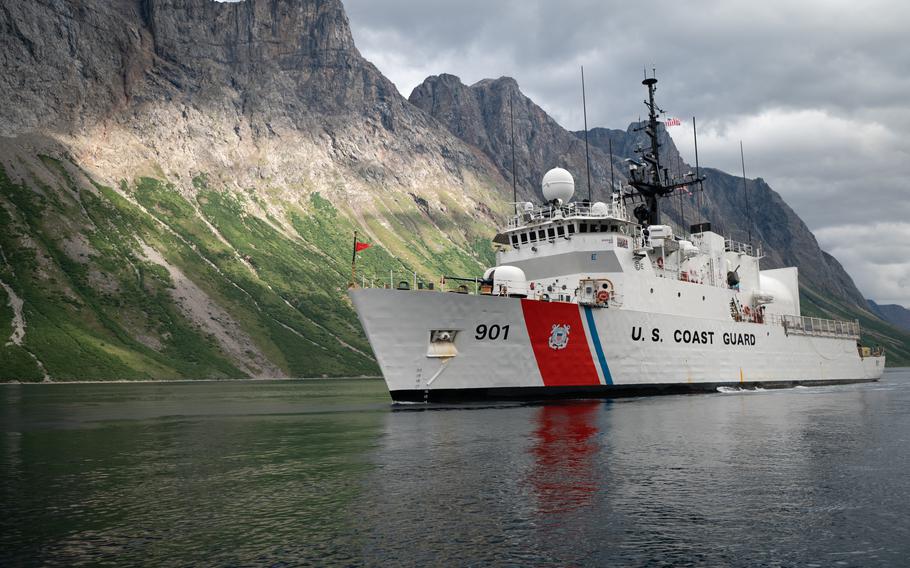
USCG Cutter Bear transits out of Torngat National Park, Canada, on Aug. 9, 2022. The Bear was partaking in the Tuugaalik phase of Operation Nanook, an annual exercise that allows the United States and multiple other partner nations to ensure security and enhance interoperability in Arctic waters. (Matthew Abban/U.S. Coast Guard)
WASHINGTON — The Coast Guard will step up operations in the increasingly contested Arctic region, crack down on illegal fishing and forced labor, and improve oil spill response under legislation approved Wednesday by a Senate committee wary of competition from Russia and China.
Members of the Senate Committee on Commerce, Science and Transportation said the Coast Guard’s mission is growing in importance as melting ice in the Arctic creates a new frontier for economic and navigational opportunities. Russia and China are developing a robust military presence in the region, with Russia boasting the largest icebreaker fleet in the world and China planning to build the largest icebreaker.
To meet that emerging threat, lawmakers want to authorize $841 million for a third Polar Security Cutter icebreaker ship for the Coast Guard and $20 million to establish an Arctic Security Cutter program office, which will begin work on the next generation of medium icebreakers.
“We are not just discussing the Arctic theoretically but making real investments,” said Sen. Dan Sullivan, R-Alaska, a colonel in the Marine Corps Reserve and a member of the committee.
Members of the service, or “Coasties,” are also expected to see more options for child care, better access to affordable housing and expanded medical care and education opportunities as they fulfill a mission to safeguard ports and waterways and secure the maritime economy, according to the Coast Guard Authorization Act for fiscal years 2022 and 2023.
The bill would authorize $14.94 billion for the service for fiscal 2023, which begins Oct. 1. It would amount to a 21.5% budget increase from fiscal 2021. The Senate Committee on Commerce, Science and Transportation overwhelmingly advanced the legislation on Wednesday.
“In my view, the Coast Guard often gets overlooked on many issues — funding, support, retirement … I’m glad to say that this bill makes good strides in a couple areas that will bring the Coast Guard up to what the other services in the military have,” Sullivan said.
The Coast Guard is the only military branch that falls outside the jurisdiction of the Defense Department and instead operates in peacetime under the Department of Homeland Security. During times of war, it can be transferred to the Navy by order of the president or Congress.
Lawmakers said they also are prioritizing efforts to end illegal fishing and forced labor on the high seas, acts largely committed by China. The bill calls for new enforcement and coordination to catch illegal fishermen and provides new training for Coast Guard personnel to identify instances of oppressive child labor in the international fishing industry.
Another major priority is improving the Coast Guard’s response to oil spills across the country, said Sen. Maria Cantwell, D-Wash., the committee’s chairwoman. The legislation requires the creation of a new program to improve response operations and a national study on regional and local oil spill response plans and their effectiveness.
The size of the Coast Guard will remain the same as in previous years, with an active-duty force of 44,500, according to the bill.
Service members are poised to see multiple new benefits under the legislation.
The Coast Guard’s child care subsidy program will get a 56% funding boost, giving families more help to pay for nannies or other types of child care. A new pilot program would assist families with fertility treatments while another will allow members to request a transfer to billets located near fertility treatment facilities.
Lawmakers are pushing the Coast Guard to improve access to affordable housing, pointing to skyrocketing costs in coastal communities where units are often based. The national housing shortage, aging Coast Guard housing and short-term vacation rentals have left many families without options, senators said, and the Coast Guard needs to study and develop a viable plan to address the issue.
The Coast Guard would also be required to develop a 10-year strategy to enhance diversity in its ranks and establish a partnership program with an institution serving underrepresented communities, according to the bill. A study last year found the representation of women and minorities declined as rank increased.
“These demographics are largely the cumulative effect of the service's personnel system in which the pool of potential senior leaders narrows at each stage of the career life cycle, along with the number of candidates from underrepresented groups,” according to Rand Corp., the study’s author.
Other legislative measures are set to improve service member access to medical care and training. The bill establishes a behavioral health policy for the Coast Guard and authorizes research into expanding telemedicine at remote stations such as Cape Disappointment in Washington state.
Another provision raises limits on how many members can enroll in post-graduate programs, aiming to raise the number of Coast Guard members training in the medical field.
Senators said they are also looking to clamp down on sexual assault, within the Coast Guard and the maritime industry. Their bill would expand penalties for failures to report sexual assault and harassment at sea and provide the Coast Guard with the authority to revoke credentials to mariners who have committed certain sex crimes.
An additional provision establishes a process for mariners to report crimes to the Coast Guard.
“Despite being under resourced, our Coast Guard men and women continue to fulfill their mission saving American lives, protecting our homeland and keeping maritime transportation flowing safely,” said Sen. Roger Wicker, R-Miss. “This bill would provide substantial support for these men and women.”
The Coast Guard last year assisted more than 20,400 people in search-and-rescue missions and saved more than 4,500 lives, according to Sen. Mike Lee, R-Utah.